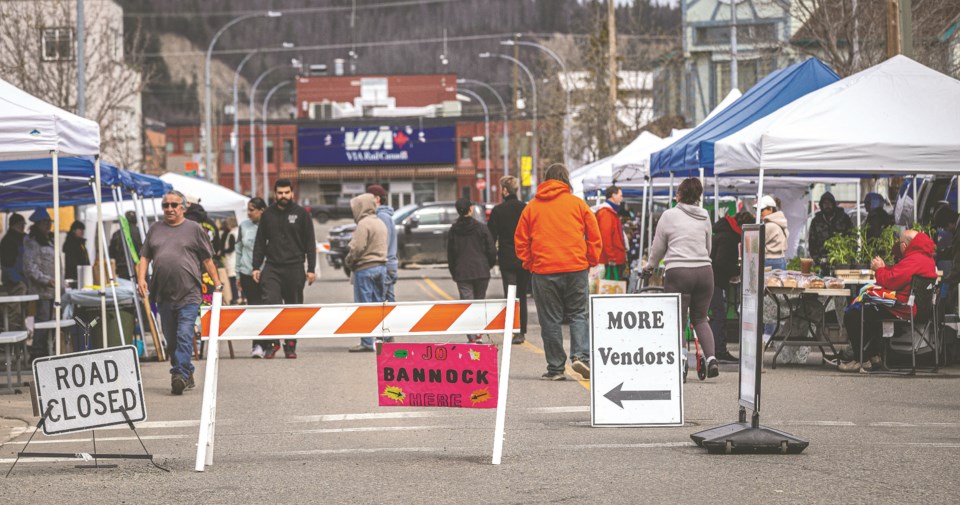With North America still reeling from the effects of an ongoing trade war — and with more politicians, businesses and individuals encouraging people to buy local — one UNBC professor has found a new way to inject money into the local economy.
David Connell, a professor at the University of Northern British Columbia, has won a UNBC Award of Excellence in Research in 2017 and a UNBC Award of Excellence in Teaching in 2014. His primary research interests include agricultural planning and local food systems.
Connell recently conducted extensive research into more than 70 farmers’ markets across the province. He concluded that more can be done to bolster farmers' markets and, by extension, the local economy.
Connell said that simply increasing the amount an average person spends annually at farmers' markets — from 0.5 per cent to 1 per cent of their food budget — could have a significant impact on both the local and provincial economies.
One person familiar with the potential effects of this 0.5 per cent increase is Martin Krell, president of the Prince George Farmers’ Market.
“It would have a huge impact,” said Krell. “That extra half per cent would allow a farmer — or multiple farmers — to build root cellars to store vegetables for sale in December, January and February. It would allow individuals to expand their animal herds and their offerings.
“It’s better for everyone. When a farmer is making money, they’re willing to try a new crop, expand their greenhouse, or invest in different farming practices. Of course, farming isn’t cheap. A lot of these farmers have their entire life savings tied up in their farms. Raising capital to expand is difficult, and any extra cash flow through the farmers' market helps. That would increase food stability.”
At the provincial level, Connell assessed the impact of farmers’ markets operating under the B.C. Association of Farmers’ Markets (BCAFM). His study found that the annual economic impact of farmers' markets is $232.9 million, with 4.95 million visits and 3.7 million shoppers annually. Direct annual sales at BCAFM member markets amounted to $155.3 million.
Despite the impressive numbers, Connell noted that spending at farmers' markets still represents only a small portion of an average family’s food budget.
“It represents such a small amount — potentially 0.5 per cent of a household budget,” said Connell. “It doesn’t take much to make an incredibly important contribution to the local food system. Diverting a small portion of your grocery budget to the farmers' market can have a dramatic effect on strengthening and directly supporting local farmers and the local food system.
“I think people are starting to realize the power of their dollar — and their ability to support something tangible, local and personal. It’s a powerful thing.”
Although $155 million in annual provincial sales is a strong figure, Connell views it more as a demonstration of untapped potential than as an indicator of peak success.
“$155 million seems like a lot at first glance,” he said. “It’s worth celebrating, but when you look at it in the context of what households in B.C. spend on food at grocery stores, it’s only a tiny amount. The results show the potential to enhance both local communities and the food system.”
More locally, Connell’s study found that farmers' markets inject $1.63 million annually into the Prince George economy. Direct sales make up $1.09 million of that total, with the average shopper spending $44.50 per visit. Approximately 24,400 shoppers visit Prince George markets each year.
Surprisingly, only five per cent of shoppers self-identified as tourists or day-trippers, meaning the overwhelming majority are local residents.
Connell told The Citizen that his main goal in conducting the study was to demonstrate and evaluate the economic power of farmers' markets.
“The main purpose of the study is to demonstrate the value of farmers' markets,” said Connell. “That includes their value to local and provincial governments and others who might be interested. Many people know about farmers' markets, but they don’t always understand their economic and social contributions. Especially among politicians — they like numbers. They like data that tells a compelling story.”
Connell’s research indicates that surrounding businesses also benefit from the presence of a farmers' market.
In Prince George, 75 per cent of shoppers reported spending an average of $45.02 at nearby businesses after visiting the market. In total, that translated to $1.16 million spent at neighbouring businesses in 2023.
Krell has witnessed the positive spillover effects first-hand.
“We bring, on average, 2,500 people into the downtown core each week,” said Krell. “Those people are wandering the street, grabbing coffee, having lunch, doing some shopping — and then coming back to the market. People are spending two or three hours downtown, and that benefits everybody.”
Beyond economic impacts, Connell also highlighted the social value of farmers’ markets.
“There’s an important social component to markets, and the results speak to that,” said Connell. “Shopping at a farmers' market isn’t like going to a grocery store, where you get in and out quickly. At a market, almost half of attendees spend at least 30 minutes there — and half of that time is spent socializing. I really like that aspect of it.”
Krell echoed that sentiment, encouraging those who want to support local businesses to head to the farmers' market.
“There’s a lot of talk about food security and buying local,” said Krell. “The Prince George Farmers' Market is where the rubber meets the road. It’s where people can buy local. It’s where they can support food security. We don’t need more committees or policies — we just need people to come down, meet their farmers and buy from them.”
Connell is scheduled to present his findings at the upcoming Congress of the Humanities and Social Sciences — one of Canada’s leading academic gatherings. The event takes place in Toronto from May 30 to June 6.



